 In the Spotlight
In the Spotlight

The ongoing 27th International Biology Olympiad (IBO 2016) in Hà Nội draws 264 students and 238 teachers from 71 countries and territories, which is reportedly the highest number of participants in the Olympiad so far. This is the first time Việt Nam has hosted a biology competition. On the occasion, some students and teachers share with Việt Nam News reporter Nguyễn Khánh Chi all about love for the science, IBO and the country that all of them are visiting for the first time.
The ongoing 27th International Biology Olympiad (IBO 2016) in Hà Nội draws 264 students and 238 teachers from 71 countries and territories, which is reportedly the highest number of participants in the Olympiad so far. This is the first time Việt Nam has hosted a biology competition. On the occasion, some students and teachers share with Việt Nam News reporter Nguyễn Khánh Chi all about love for the science, IBO and the country that all of them are visiting for the first time.
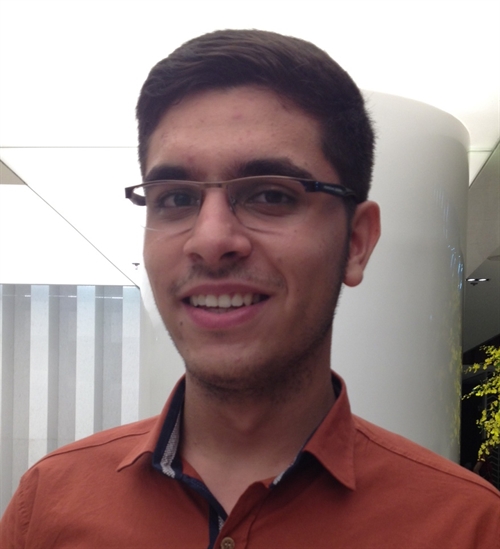 |
| Shady Masharka, Syria. |
Shady Masharka, Syria, contestant:
This is my first visit to Việt Nam and first time going abroad and first time I participated in an IBO. When I saw a great number of students from different countries, there are two sides: it’s a beautiful chance to make friends with people from other countries but it’s a bit scary when standing and competing with people from all over the world.
The exams were interesting but really hard for everyone, they needed a lot of time. Nobody can finish all the tasks. But I think we have done our best. Before the IBO, we had five to six days of practical training for how to use lab equipment. Actually, it took me about two years to prepare for the IBO, hoping that I get good results.
I found myself interested in biology since I was young. In fourth grade, I participated in the national biology competition for children and I won for my city. In 10th grade I attended the National Biology Competition and took fifth place. This year again, I made it to first place.
In the future I would like to be a biologist who does research into DNA and microbiology.
Việt Nam is a country with beautiful nature and culture as well, even though it is a bit hot and humid here.
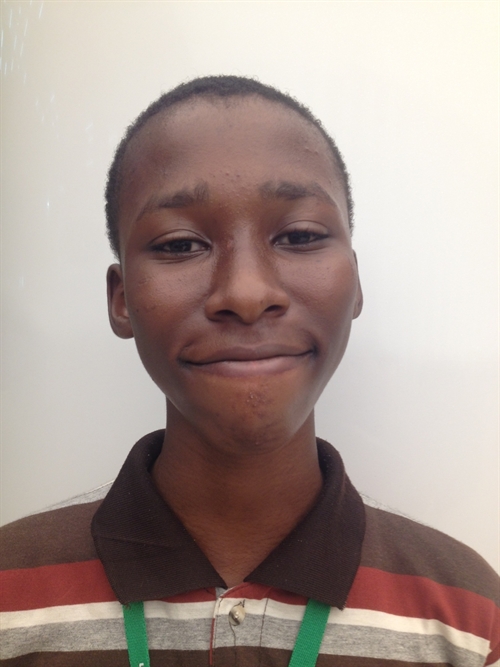 |
| Ayoola Babatunde, Nigeria. |
Ayoola Babatunde, Nigeria, contestant:
Today, I found it [the test] alright. The major challenge with the test was time. The time was not enough. There were four sections and I didn’t finish them all.
Back in Nigeria, I had two weeks of practical training ahead of the IBO. We had some choices but most of the work I did on my own.
I have been interested in biology since I was little but I started studying biology at secondary school two years ago. I love biology, it’s applicable to every day situations.
The first thing I felt is happiness and great privilege to be among the best competing in biology for secondary school students. And it’s great to interact with people from other countries, other places, other languages. So it’s great opportunity for me.
Việt Nam is a very nice and wonderful country. Visiting Hà Nội, I also get opportunities to see cultural stuff. Việt Nam and Nigeria are slightly different in term of climate, and in terms of everything else, it’s quite different. For me, it’s all new so it’s really wonderful.
I didn’t know much about Việt Nam before I came. The only thing I knew or heard about Việt Nam is the American War. Now, I will bring home memories of the beauty of this place.
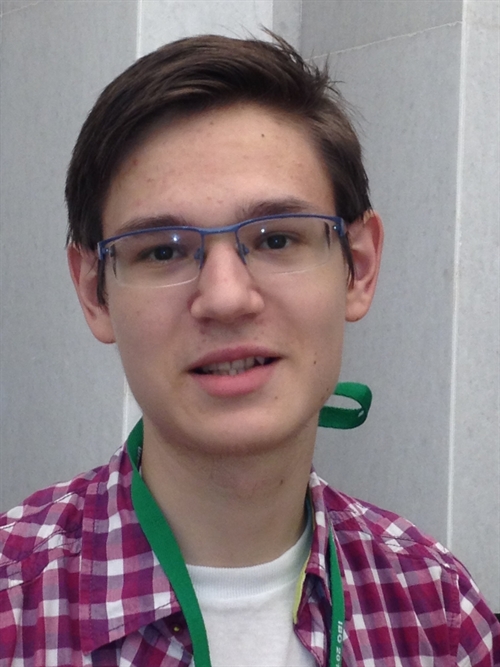 |
| Albeit Vaishevich, Belarus. |
Albeit Vaishevich, Belarus, contestant:
This morning [July 19] we competed in practical tests in biochemistry and microbiology, molecular biology, animal anatomy and systematics, and plant anatomy and physiology. It was difficult but all of them were interesting. Some of them were hard and we did not get enough time to finish. It is fun to be here and I do believe that our team will get a medal.
We worked in groups. We do practical exams and do some hand work like preparing earth worms. During the process, you should work very fast, you think and do hand work at the same time. Sometimes, you didn’t even see the last questions.
I like the Olympiad. This is my first time, and it is very good for us all.
We came not only for the IBO but also to see Việt Nam’s culture like the water puppetry.
Việt Nam is quite similar to Belarus in politics and society but the climate is quite different. It’s really hot here.
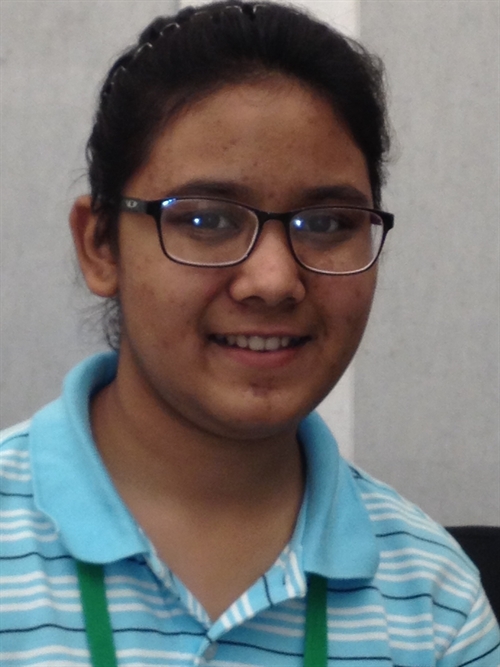 |
| Vidushi Varshney, India. |
Vidushi Varshney, India, contestant:
Some parts [of the test] I did alright, some parts are really tough.
Being here, standing among a lot of people I felt both nervous and excited. Of course, it gave me different experiences.
We are all curious about each other so we talked a lot, it’s an awesome experience. We have four students, two boys and two girls, with two observers and two jury members from India.
This is my first time at an IBO. Last year, I went to South Korea for the South Korea International Junior Science Olympiad and I got a silver.
It’s my first visit to Việt Nam and I find it a beautiful country. It’s interesting that you arrive in a new city and get a chance to explore things and learned a lot about local culture. On July 17, we went to a zoo and saw a lot of animals, many of them I saw for the first time. We went to the Temple of Literature and the Old Quarter on Monday, and then the Museum of Ethnology on Wednesday.
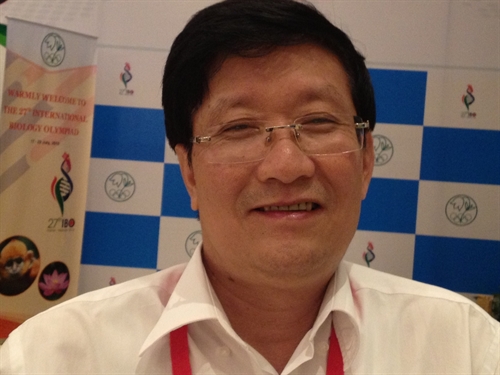 |
| Dr. Mai Sỹ Tuấn, IBO 2016’s Scientific Committee. |
Dr. Mai Sỹ Tuấn, a lecturer at the Hanoi National University of Education’s Biology Faculty and head of the IBO 2016’s Scientific Committee.
As regulated by IBO, a member country has to organise an Olympiad every ten years. It takes Việt Nam almost 20 years to make it.
Organising a biology Olympiad is complete different from other Olympiads because biology is broad in knowledge. Additionally, it requires a lot of facilities like laboratories and equipment as well as materials. Usually, countries with sound infrastructure system will be capable of hosting such an event. Việt Nam should have held an IBO six years ago, but due to our material and human resources, we could only do it now.
An IBO requires both basic and modern experiments which clearly demonstrate the host country’s scientific level.
Việt Nam’s biology is underdeveloped and unequal with many other countries so organising such an event is really challenging. Luckily enough, we had great support from local scientists and research institutes. In many countries, the IBO is not funded by the State, but by social organisations whereas in Việt Nam, the State financed it [the IBO 2016].
As usual, the host country has to compile the tests which must meet international standards. The tests must go through three rounds of judgment: a council of six international advisers, a 30-member subjury and a 238-member jury. It is a huge challenge. And we made it.
Regarding the tests, the host country always tries to bring its most typical features into the tests. However, it greatly depends on the country’s natural conditions. Some samples, truly Vietnamese, we had to prepare for two and a half years. They were eventually approved without any ’vote’ against. Việt Nam is a tropical country so we have plenty of plant varieties which are unavailable in temperate nations, so the materials are quite novel and interesting.
It is interesting that the samples are not simply for the tests but contestants can bring them home as a souvenir. I can tell you that we do not only use natural materials but also Vietnamese typical farming produce.
The Olympiad is so far so successful with the practical parts. We will have two-thirds of the theoretical tests today.
For young scientists, IBO is the chance for them to get to know each other, learn from each other and learn about the host country’s culture. Not all participants will bring home the bacon, but they will bring something bigger – that is one of IBO’s objectives. IBO is also the chance for people working in the field get connected with each other.
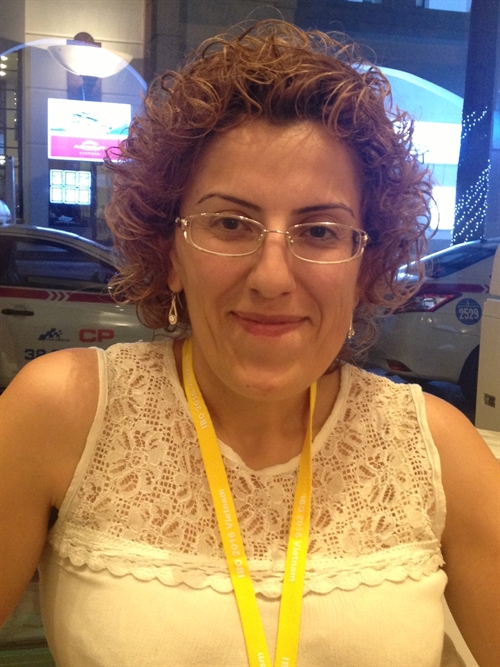 |
| Hovsepyan Meri, Armenia. |
Hovsepyan Meri, Armenia, a jury member:
The students study hard and it’s good thing that they are here to get to know and compete with each other, and have high expectations from other students as well. Generally speaking, they are well-prepared and are doing well though the tests are quite hard, not easy at all.
There are four students from Armenia. Actually we had our National Biology Olympiad and had short training courses for them to prepare for the IBO a few weeks before.
This is my fourth time that I have been at an IBO. At the moment, we [the jury] are translating materials to get the theoretical exams ready for today. The preparation [by Việt Nam] is done really well with tests that are nicely compiled, very interesting and high-quality.
Many students are still getting interested in biology as new discoveries come and new opportunities appear.
However, as a matter of fact, fewer young people are going into science in Armenia. Actually, I can see there is no rise in the interest in biology. This is not due to biology but there are special fields which attract them more and they do not want to be a scientist.
In Armenia, it’s really hard now. Students do not turn to science that much as the salary is comparatively low. For example, if you are scientist or a doctor of science, you will get a lower salary than if you work in a bank. So they prefer going to the bank or going abroad, rather than staying in science.
I think it is very important that the Government and other institutions as well should support them [scientists] to travel a lot and do experiments. For science, you need a lot of money for equipment, materials, and experiments. With that, they can do something here, do something abroad, and having good publications. If they get a nice career and salary opportunities, they will stay put. — VNS